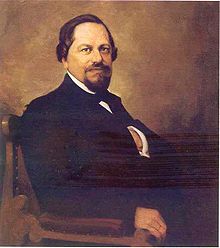Simon Sinas
Simon Sinas | |
|---|---|
 Portrait of Simon Sinas | |
| Born | 15 August 1810 |
| Died | 15 April 1876 Vienna, Austria-Hungary |
| Nationality | Austrian, Greek |
| Occupation | Businessman |
| Known for | Benefaction and Diplomacy |
Simon von Sina or Simon Sinas (Greek: Σίμων Σίνας; 1810–1876) was an Austrian banker, aristocrat, benefactor and diplomat of Greek origin.[1]
Biography[]
Simon Sinas was born on August 15, 1810 in Vienna.[2] He was of Greek origin with his family originating from the Greek minority in Moscopole.[1][3] He served as Greek consul in Vienna, and later as minister to Austria, the Kingdom of Bavaria, and Germany. The son of Georgios Sinas,[3] also a benefactor and diplomat, Sinas expanded his father's business. He also made major donations to various educational and scientific foundations in Austria, Hungary, and Greece.[4] During his time as Greek Ambassador in Vienna, he hosted the "Greek Ball" in the Palais Sina for which Johann Strauss II composed the Hellenen-Polka (Hellenes Polka) op. 203.
Sinas became director of Austria's central bank Oesterreichische Nationalbank and established the Simon Georg Sina banking house in Vienna.[2] Following the end of the Second Schleswig War (or German-Danish War) in 1864, he funded the return transport of Austrian forces from the region of Schleswig-Holstein.[2] From 1874 onwards, Sinas held a position in the Herrenhaus of Austria.[2]
Sinas was the donator and founder of the Hungarian Academy of Budapest, the Holy Trinity Greek Orthodox Church, Vienna, the Athens Orthodox Cathedral, the Athens Academy, and others.[4] His father had made the foundation of the National Observatory of Athens possible.[5] Since Sinas was also a patron of astronomers, the crater Sinas on the Moon was named after him.[6] Sinas died in Vienna on April 15, 1876.[2]
References[]
Citations[]
- ^ Jump up to: a b Dent 2007, p. 9: "...Count Simon Sina, a banker, aristocrat and landowner of Greek origin, and one of the wealthiest men of his day. His father, George Sina had been a chief financier backing the construction of the Chain Bridge."
- ^ Jump up to: a b c d e Killy & Vierhaus 2005, p. 346: "Sina, Simon Georg, from 1832 onwards Baron von Hodos und Kisidia, Austrian banker, * 15.8.1810, Vienna; † 15.4.1876, Vienna. S., the son of Georg Simon → S., founded the banking house of Simon Georg Sina in Vienna and was director of the Austrian National Bank. In 1864 he financed the return transport of the Austrian troops from Schleswig-Holstein following the German-Danish War. S. was a member of the board of management of the General Hungarian Credit Bank and the board of administration of the Rossitz mining company. He was also a member of the executive senate of the Hungarian Academy of Sciences and the Academy of Fine Arts in Vienna. S. held a seat in the Austrian Herrenhaus from 1874 onwards."
- ^ Jump up to: a b Killy & Vierhaus 2005, p. 346: "Sina, Georg Simon, from 1832 onwards Baron von Hodos und Kisidia, Austrian banker, * 20.11.1782, Moschopolis; † 18.5.1856, Vienna. S., the son of a merchant, worked mainly in the banking sector. Together with Salomon Mayer von → Rothschild, he was involved in all state loans and their associated share issues from 1830 onwards. He owned numerous domains in Lower Austria, Bohemia, Moravia and Hungary and possessed shares in a large number of financial and economic ventures. Among other things, he was deputy governor of the Austrian National Bank and president of the State Railway Company. He played a leading role in the expansion of the Hungarian railway network and financed the construction of the Chain Bridge over the Danube between Buda and Pest, which was built between 1842 and 1849. After Rothschild, S. was regarded as the second richest man in Austria. He was the father of Simon Georg → S."
- ^ Jump up to: a b Moscow Patriarchate 1978, p. 84: "A son of the rich Greek family of Sina, Simon Sina the Younger did many good works, contributing large sums of money for the building of Athens University and the Hungarian Academy of Sciences, the Art Gallery, the Institute for the Blind, hospitals, schools and in particular Orthodox Churches and other ecclesiastical institutions."
- ^ "Η Ίδρυση του Αστεροσκοπείου Αθηνών" (in Greek). Εθνικόν Αστεροσκοπείον Αθηνών. 2013.
- ^ Rükl & Rackham 1991, pp. 98: "Sinas [8.8°N, 31.6°E] Simon Sinas, 1810–1876. Greek merchant, patron of astronomers, bequeathed Athens Observatory. Circular crater (12.4 km/2260 m)."
Sources[]
- Dent, Bob (2007). Budapest: A Cultural History. Oxford: Oxford University Press. ISBN 978-0-19-531494-6.
- Killy, Walther; Vierhaus, Rudolf, eds. (2005). Dictionary of German Biography (Volume 9: Schmidt – Theyer). Munich: K.G. Saur (Walter de Gruyter). ISBN 9783110966299.
- Moscow Patriarchate (1978). The Journal of the Moscow Patriarchate. Moscow: Moscow Patriarchate.
- Rükl, Antonín; Rackham, T.W. (1991). Atlas of the Moon. London: Hamlyn. ISBN 9780600571902.
Further reading[]
- Stoianovich, Traian (June 1960). "The Conquering Balkan Orthodox Merchant". The Journal of Economic History. 20 (2): 234–313. doi:10.1017/S0022050700110447.
- 1810 births
- 1876 deaths
- Greek diplomats
- Austrian people of Greek descent
- German people of Greek descent
- Northern Epirotes
- Greek people of Aromanian descent
- People from Moscopole
- Greek philanthropists
- 19th-century philanthropists